
John Malkovich © Elena Ringo
Just Call Me God – John Malkovich is a dictator in a darkly funny stage play.
Just Call Me God: A dictator’s final speech is the third stage play with Hollywood star John Malkovich (Dangerous Liaisons, Being John Malkovich) and Austrian director Michael Sturminger. Their previous collaborations were “The Infernal Comedy” and “The Giacomo Variations”, which was also adapted to a film starring Malkovich by Sturminger. Just Call Me God premiered at the Elbphilharmonie in Hamburg and was performed in Vienna on the 12th and the 13th of March. It will be later staged in the UK, Moscow, Budapest and in many other countries.
In the Third-World country of Circassia, armed American soldiers shuffle about underground in the dark, armed with flashlights and assault guns as they search for the eccentric dictator Satur Diman Cha who has terrorized the country for decades.
As the troopers look around, they discover that they are in the Ar-Kasaba Palace Concert Hall – a replica of the Vienna Konzerthaus (in other countries different concert halls are mentioned) which the dictator has built many meters below the desert. There is also a joke when they mix up the Konzerthaus with the Musikverein twice. During their inspection they only find banners, a lectern and an organ. Among the soldiers is Caroline Thomas, a journalist of the TV station NCC (Sophie von Kessel) and a military chaplain, reverend Lee Dunklewood (Martin Haselböck).
Then they receive a radio transmission informing them that Satur Diman Cha was found in a suburb and killed. The soldiers breathe easy and request the reverend to test out the organ. Dunklewood plays the Ride of the Valkyries by Richard Wagner on the organ and at this moment a woman clad in a headscarf, propelling a cleaning cart, enters the room and shoots almost everyone dead with a machinegun.
The shrouded figure begins to talk in a heavily-accented male voice and takes the disguise off, it turns out to be Satur Diman Cha himself. With a drawn golden pistol he instructs the survived reverend to play the organ; he hands Dunklewood over the score of All Men Must Die by Johann Sebastian Bach and tells him to play on or die right now. Diman Cha nicknames the chaplain as Bach.
Later Diman Cha discovers that the female journalist is still breathing and holds Caroline hostage. He instructs her to tie up the organist with duct tape to the bench. The dictator refers to Caroline as sweetheart and she even manages to take a video interview with him despite him not conversing with the Western press in many years. When Caroline asks how Diman Cha should be addressed in the interview, he says – just call me god. They hold discourse about power and the meaning of evil and throughout the play there is strong tension because the tyrant is clearly capable of killing the reporter and the organist at any moment.
Director Michael Sturminger said that the character of Satur Diman Cha in Just Call Me God was supposed to an amalgamation of many historical figures including Stalin, Pol Pot, Mao Zedong, Saddam Hussein and Muammar al-Gaddafi.
Music featuring the organ combined with additional electronic effects, ranging from classical compositions to Haselböck’s own pieces, was a beneficial addition and set a suitably eerie mood. Malkovich’s voice was also sometimes amplified and distorted in order to portray a man who thinks of himself as almighty.
The organ was chosen because of its association with power, it was a beloved instrument of many rulers and is an intense musical tool because it has the ability to resemble a whole orchestra.
The addition of the two video screens was an interesting idea. As the main characters operate the journalist’s video camera, the two screens show the live output which allows the viewers to see the actors in close-up. Also since the play is in English but intended for an international audience, the subtitles are shown for the non-English speaking viewers.
Just Call Me God is a spirited musical-theater piece full of dark humor. John Malkovich is convincing and magnetic in the role where he must shift between cruelty and gentleness. The sparse staging is fitting for this character driven performance and the ending is not too predictable. The play is a must see for people interested in modern theater and for fans of Malkovich.
